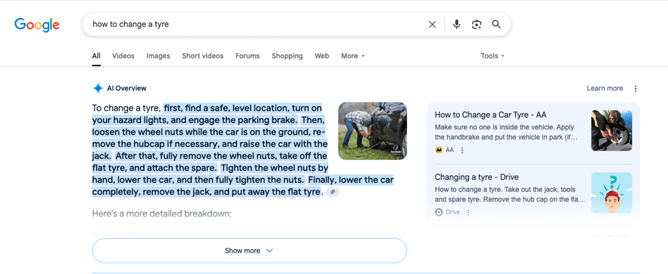You've got your H1s, page titles and keywords sorted. You've played the SEO long game. And just when you've hit the coveted first page, AI is changing how people search, and how they find your brand. Rude!
What's actually changing in search?
With the rise of AI-powered tools like:
ChatGPT (with web browsing enabled)
Google’s Search Generative Experience (SGE)
Bing Copilot
Perplexity.ai
…the online search experience is evolving.
People are asking more specific, conversational questions like:
“Who's the best B2B website copywriter in New Zealand with experience in AI strategy?” (You already know that one, teehee). Or: "How can I make ChatGPT sound like my voice?”
And instead of clicking through to 10 different blog posts, they’re getting answers instantly, summarised by AI (like the image below).
Unlike traditional search engine rankings, AI overviews and AI-powered search surface information dynamically. It finds the exact answer you're looking for, rather than presenting a list of links where you will have to click through to find the answer yourself.
This changes the game.
Why organic traffic might be down (and it's not just you)
If your website traffic has dropped recently, you’re not alone. AI search traffic is a relatively new channel but it's the fastest growing. More answers are being surfaced in AI tools without a click.
Instead of scanning a page of blue links like traditional Google results, users are now asking more specific, conversational questions and receiving complete, summarised answers. No need to click. No need to read a full blog. No cookie banner, no scroll.
This means:
Users may never reach your site, even if your content is quoted
Your authority might be surfaced, but not attributed
You’re competing to be summarised, not just indexed
It’s a big shift. But it’s also an opportunity (if you structure your content with AI visibility in mind).
And if your site is not currently being cited, this doesn’t mean your content isn’t useful, but it might mean:
It’s not structured to be picked up by AI summaries
It’s buried behind vague headlines or SEO fluff
It lacks the clarity or specificity that AI tools prioritise
Benefits of optimising for AI search
Increased visibility, even without clicks
AI tools like ChatGPT and Google SGE are surfacing content in their responses, often without requiring the user to click. If your site is structured clearly and your content is high-quality, you can be cited, quoted, or summarised, putting your brand front and centre even if traffic doesn’t follow.
Homepage & category page boosts
AI is starting to favour top-level pages (like your homepage or key service pages) as sources of authority. This means optimising those pages — not just your blog — can increase impressions in AI results and AI-powered browsers like Perplexity or Copilot.
Content longevity
AI tools summarise the most helpful, evergreen content, not necessarily the most recent. High-quality, well-structured posts that clearly answer questions can continue to get picked up long after their publish date.
Stronger authority & brand recall
Even if users don’t visit your site directly, being named or quoted by AI tools builds trust. You start to become perceived as the “go-to” in your space — especially if your content is accurate, personal, and aligned with your expertise.
Competitive advantage in a shifting landscape
Many businesses are still playing catch-up. By optimising for AI now, you’re positioning your brand ahead of the rest, building systems and content that work both for human readers and AI summarisation models.
How to optimise for AI search engines
Here’s what the brands getting it right are doing:
1. Write clear, specific, human answers
AI tools are designed to summarise. If your content is buried under 200 words of introduction, you’ll be skipped.
Instead:
Start with the answer
Use clear subheadings
Break content into scannable blocks with obvious takeaways
2. Optimise for questions, not just keywords
Think:
“How do I get ChatGPT to sound like my brand?”
“Best way to train AI on brand voice”
“Should I use ChatGPT to write my About page?”
Use those exact questions as headings or anchor text. It’s not just about what people type — it’s how AI summarises your site for them.
3. Use structured, semantic content
AI models look for clarity and context. So:
Use bullet points, short paragraphs, and clear formatting
Add FAQs to service pages
Keep your URLs and meta titles straightforward
4. E-E-A-T still matters (maybe more than ever)
AI tools do favour content that reflects:
Experience (you’ve done the thing)
Expertise (you know the thing)
Authoritativeness (you’re recognised for it)
Trustworthiness (you’re credible and safe to surface)
That means:
Add an author name and bio
Link to credible sources
Share first-hand insight, not recycled fluff
5. Create content that's worth summarising
AI tools love clarity, but they also value depth. Instead of publishing 100 generic blog posts, focus on:
Deep dives into specific, niche topics
Thought leadership based on your experience
Answering real questions from your clients and community
So, is AI search just... the same as SEO?
Yes and no.
Yes, in that SEO principles still apply: relevance, clarity, structure, targeting real user questions, creating high-value content with purpose.
No, in that the end user might never visit your website. They might only ever read the summary of what you've written. In traditional search, the goal was a click. In AI search, the goal is often just the answer.
Your content might be surfaced, referenced, or summarised, but the user may never visit your site.
Instead, your job now is to:
Be cited by AI
Show up in AI summaries
Offer clear, structured information that’s worth repackaging
The brands getting it right are focused on:
Thoughtful formatting
Specific, valuable content
Author credibility
Voice and clarity that can survive summarisation
That means content visibility = SEO + UX + AI fluency.
What to do next
Audit your website for clarity, structure and value.
Start writing with questions and summaries in mind.
Consider what you want AI tools to say about your business, or what you want to be known/found for, and write about that.
If you need a hand creating a plan, I can help you align your brand messaging with your SEO goals so your site gets found (whether by a real reader or a bot trained to summarise!).


